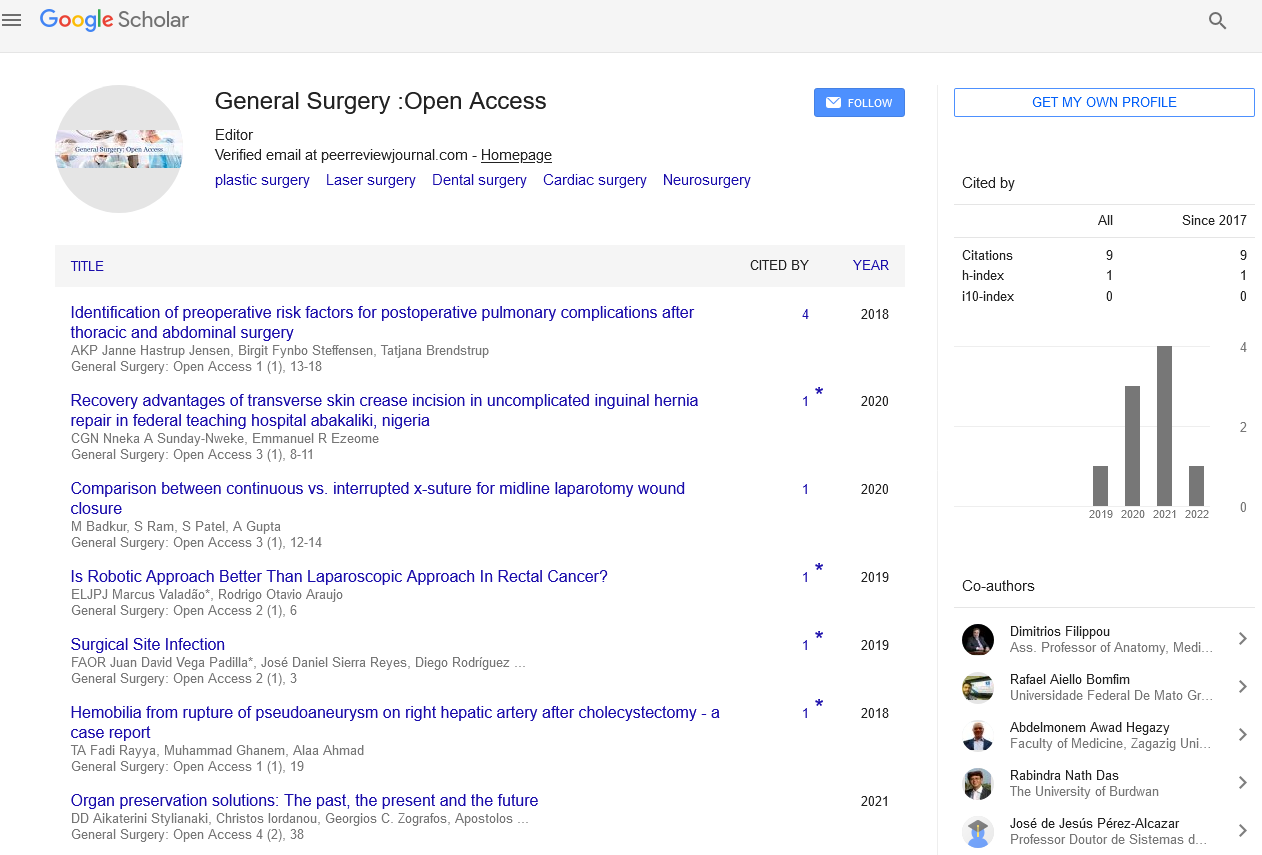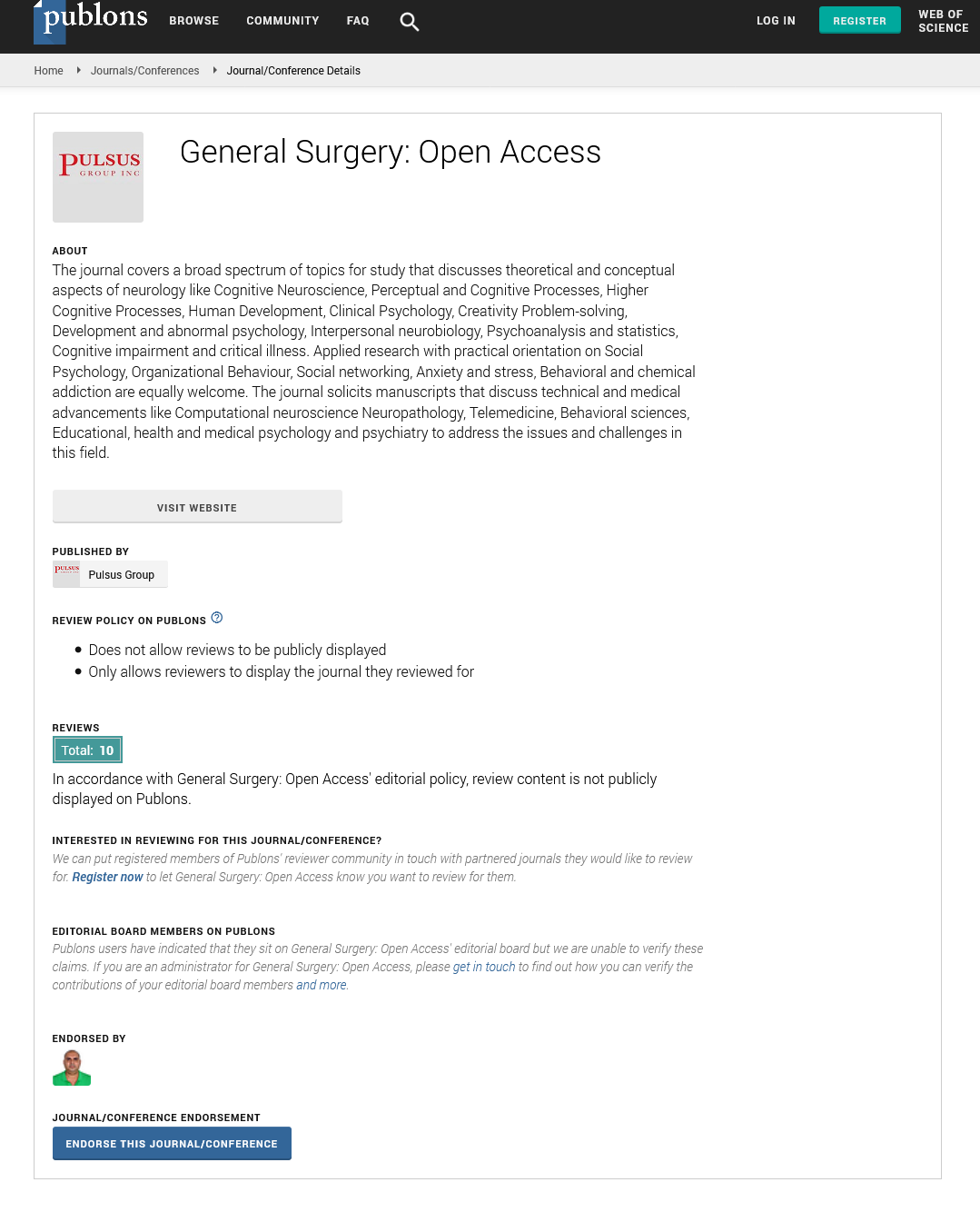A Cross-sectional study of patient variables related to greater cancer concern, fatigue, and effect on work after a breast cancer diagnosis
Received: 03-Jan-2023, Manuscript No. PULGSOA-23-6284; Editor assigned: 08-Jan-2023, Pre QC No. PULGSOA-23-6284(PQ); Reviewed: 18-Jan-2023 QC No. PULGSOA -23-6284(Q); Revised: 04-Feb-2023, Manuscript No. PULGSOA -23-6284(R); Published: 14-Feb-2023
Citation: Smith, D., Effect of the timing of the health insurance contract on the completion of breast reconstruction. Gen Surg: Open Access. 2023;6(1)3-4.
This open-access article is distributed under the terms of the Creative Commons Attribution Non-Commercial License (CC BY-NC) (http://creativecommons.org/licenses/by-nc/4.0/), which permits reuse, distribution and reproduction of the article, provided that the original work is properly cited and the reuse is restricted to noncommercial purposes. For commercial reuse, contact reprints@pulsus.com
Abstract
A breast cancer diagnosis may result in disabling effects which may persist after treatment. This study aimed to identify patient factors that are associated with increased cancer worry, fatigue, and impact on work. Methods: Women with a history of breast cancer, aged ≥18 years, and English-speaking were recruited through the Love Research Army between October and November 2019. Participants completed demographic and clinical questions alongside the BREAST-Q Cancer Worry, Fatigue, and Impact on Work scales. Univariable and multivariable regression analyses were used to identify participant characteristics associated with each scale. This study reveals patient characteristics associated with increased cancer worry, fatigue, and a negative impact on work following a breast cancer diagnosis. These findings can inform clinical and research initiatives to better support patients through treatment and survivorship.
Introduction
Breast cancer is the most common malignancy in women, with treatment typically requiring surgical resection with or without systemic or focused neoadjuvant or adjuvant therapies [1]. While women who undergo breast cancer surgery generally demonstrate favorable outcomes concerning Health-Related Quality of Life (HRQL), disabling symptoms associated with surgery and concomitant treatment may persist after the treatment period [2,3]. Specifically, patient HRQL concerns about fear of cancer progression/recurrence,2,3 chronic fatigue, as well as impaired return to work or pretreatment activities, are commonly reported in the literature [4,5]. Despite known sequelae of breast cancer and its treatment, there exists a paucity of evidence that seeks to prognosticate which patients are likely to struggle following a breast cancer diagnosis. As such, efforts by clinicians and researchers to identify patients at high risk of poor HRQL outcomes following a breast cancer diagnosis can aid resource allocation to ensure these individuals are adequately supported. Specifically, Park et al. advocate for targeted survivorship care in breast cancer survivors to improve HRQL outcomes [6]. To understand the impact of breast cancer and its treatment on patient HRQL, condition-specific patient-reported outcome measures (PROMs) are required [7,8]. To date, the BREAST-Q is the most frequently used PROM to measure HRQL outcomes in this patient population.8 Specifically, the BREAST-Q Breast Cancer module utilizes independently functioning scales to measure the outcomes that matter to patients with a breast cancer diagnosis. Specifically, our research team developed and validated three novels BREAST-Q Breast Cancer module scales that measure HRQL outcomes specific to cancer worry, fatigue, and impact on work. These scales are designed for patients who have undergone either breast reconstruction, mastectomy without reconstruction, or breast-conserving therapy. In this study, the authors sought to perform an exploratory analysis using patient data collected from the PROM field-test validation study of the BREAST-Q Cancer Worry, Fatigue, and Impact on Work scales. The primary aim was to identify which patient clinical and demographic characteristics are associated with poor HRQL outcomes following a breast cancer diagnosis.
Conclusion
The BREAST-Q Cancer Worry, Fatigue, and Impact on Work HRQL scales are rigorously developed and validated PROMs designed for use in patients with a breast cancer diagnosis. For outcomes researchers, this analysis is hypothesis generating and identifies patient variables that may influence scale scores in this population. Clinicians and study investigators should follow up with patients who endorse predictors significantly associated with reduced HRQL outcomes, address areas of concern in participant scale scores, and ensure patients are offered further support, if necessary. The results of this study can be used to identify patients at high risk of poor HRQL outcomes following a breast cancer diagnosis and can aid resource allocation to ensure these individuals are adequately supported. Future research is necessary to confirm these associations in a diverse, prospective patient sample and establish minimal clinically important differences for these scale scores.
References
- Bray F, Ferlay J, Soerjomataram I, et al. Global cancer statistics 2018: GLOBOCAN estimates of incidence and mortality worldwide for 36 cancers in 185 countries. CA: cancer j clin 2018: 68(6);394-24.
- Johns SA, Stutz PV, Talib TL, et al. Acceptance and commitment therapy for breast cancer survivors with fear of cancer recurrence: a 3â?arm pilot randomized controlled trial. Cancer. 2020: 126(1);211-8.
- Maheu C, Hebert M, Louli J, et al. Revision of the fear of cancer recurrence cognitive and emotional model by Leeâ?Jones et al with women with breast cancer. Cancer Rep. 2019: 2(4);e1172.
- Abrahams HJ, Gielissen MF, Verhagen CA,et al. The relationship of fatigue in breast cancer survivors with quality of life and factors to address in psychological interventions: a systematic review. Clin. psychol. rev. 2018:63;1-1.
- Schmidt ME, Scherer S, Wiskemann J, et al. Return to work after breast cancer: The role of treatmentâ?related side effects and potential impact on quality of life. Eur j cancer care. 2019: 28(4);e13051.
- Park J, Rodriguez JL, O’Brien KM, et al. Healthâ?related quality of life outcomes among breast cancer survivors. Cancer. 2021:127(7);1114-25.
- Montazeri A. Health-related quality of life in breast cancer patients: a bibliographic review of the literature from 1974 to 2007. J exp clin cancer res. 2008: 27(1);1-31.
- Mokhatri-Hesari P, Montazeri A. Health-related quality of life in breast cancer patients: review of reviews from 2008 to 2018. Health qual. life outcomes. 2020: 18;1-25.






